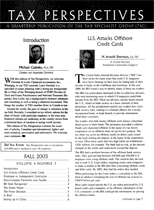
PDF Format
 Issue Contents Issue Contents
 All Issues All Issues
Fall 2003
Volume 3, Number 3
The information in Tax Perspectives is prepared for general interest only. Every effort has been made to ensure that the contents are accurate. However, professional advice should always be obtained before acting and TSG member firms cannot assume any liability for persons who act on the basis of information contained herein without professional advice.
In Brief
By Howard L. Wasserman, CA, CFP, TEP
Cadesky and Associates LLP (Toronto)
No Stock Option Relief The Department of Finance has decided not to give relief to those individuals who have exercised stock options and whose shares were subsequently worth far less than the original exercise price. In the situation described above, the individual would have employment income and a capital loss. Since the capital loss can only be offset against capital gains, there is no relief for the employment income portion, which has been recognized. This was a common situation during the high-tech boom of prior years, where employees were exercising stock options and holding the shares on the assumption that those shares would continue to increase in value. But certain employees were forced to exercise stock options, such as those who left the company or were otherwise faced with expiration of the options. Sometimes escrow arrangements prevented the shares from being sold. The Department of Finance's refusal to provide relief is premised on its belief that employees who exercised stock options and decided to hold the shares, then became investors from that point onward. But there are many situations where that simply is not the case. The Department of Finance concluded that it is difficult to justify special relief to individuals who simply choose to accept a market risk and lose. Accountant Client Privilege In a recent case, the Federal Court of Appeal came to the conclusion that there is no accountant-client privilege. In this case, the CCRA asked for information pursuant to subsection 231.2(I) from the client's accountant. The accounting firm tried to argue that they were not required to provide the information requested. However, the Federal Court of Appeal stated that the worst that could happen if the person is discouraged from seeking income tax advice from an accountant because of the lack of privilege is that the person might fail to take advantage of a tax saving opportunity. This was contrasted with an individual's physical, mental and spiritual integrity, which is presumed to be protected by solicitor privilege. The counsel for the accounting firm noted that in the United States, there is a certain level of privilege with accountants, but this is authorized by statute. The Federal Court of Appeal's response to this was that any change of this nature would have to be made by Parliament and not by the Court. The other important point from this case is that tax advisors must not only provide the documents requested, but also must answer virtually any question which CCRA considers necessary in reviewing the taxpayer's affairs. The taxpayer and/or advisors will be required, at their own expense, to respond to the questions posed by CCRA or face penalties. Replacement Shares on Immigration The Department of Finance recently produced a comfort letter dated June 2, 2003 relating to the proposed amendment to section 128.3. Section 128.3 provides that where an individual acquires a replacement share, the new share will be deemed to be the same as the old share for many of the deemed disposition rules on departure from Canada. Property owned by an individual is not subject to the deemed disposition rules on emigration from Canada if the individual, during the last 10 years, was not resident in Canada for more than 60 months and owned the property when the individual first took up residence in Canada or inherited the property after that time. Since section 128.3 did not apply to this subparagraph, a short-term resident who received new shares, say, in a corporate restructuring, after coming to Canada, for old shares owned prior to arrival, would be deemed to dispose of these new shares on leaving. This seemed unfair since there are rules that allow returning residents to "unwind" transactions subject to the departure tax rules. The Department of Finance has reviewed this situation and has decided that section 128.3 should apply and will propose amendments to that effect. How far the rule will go remains to be seen.
| 



